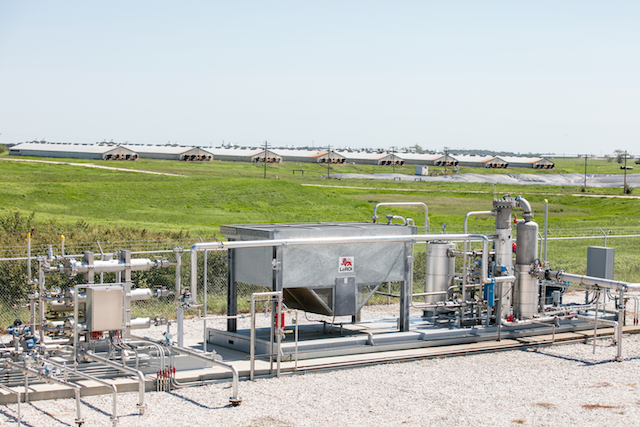Today, Smithfield Foods and Roeslein Alternative Energy (RAE) announced that they have formed a joint venture called Monarch Bioenergy to produce renewable natural gas (RNG) across Smithfield’s hog farms in Missouri.
Building on the first phase of Smithfield and RAE’s “manure-to-energy” project across nine Smithfield farms in northern Missouri, which is the largest project of its kind according to the company, Monarch Bioenergy will install and utilize infrastructure to to capture methane emissions from additional hog farms and convert them into pipeline-quality natural gas, which will be distributed to RNG markets across the country.
The biogas created by Monarch Bioenergy is transported through a gas gathering network and purified in a centrally located gas cleaning system designed and installed by RAE. This project produces biogas that has received the lowest carbon intensity score ever recorded. Biogas with low carbon intensity reduces greenhouse gas emissions and achieves air quality benefits, said RAE.
 Monarch Bioenergy will also sustainably harvest native prairie plants and cover crops that have been restored on highly-erodible lands. The biomass will be digested to produce additional RNG in Missouri. This project leverages harvested prairie plants to create biomass for RNG production while also providing wildlife habitat for monarch butterflies.
Monarch Bioenergy will also sustainably harvest native prairie plants and cover crops that have been restored on highly-erodible lands. The biomass will be digested to produce additional RNG in Missouri. This project leverages harvested prairie plants to create biomass for RNG production while also providing wildlife habitat for monarch butterflies.
“Generating energy from manure, prairie, or other biomass is pretty simple,” said Rudi Roeslein, founder and president of RAE in a press release.
“Manure is captured in the underfloor of the hog buildings where scrapers are used to move and flush waste to an anaerobic digester or a covered lagoon, where anaerobic digestion takes place and solids are broken down to release methane gas that is transported to a central processing facility to be converted into renewable natural gas. Harvested prairie is used to supplement hog manure as an alternative source of energy. Prior to harvest, native prairie and cover crops provide an essential ecological service as critical habitat for pollinators and wildlife.”
Once complete, all Smithfield company-owned finishing farms in Missouri will have the infrastructure to produce RNG, resulting in approximately 1.3 million dekatherms of RNG annually.
This joint venture helps both Smithfield and RAE meet their companywide sustainability goals. Monarch Bioenergy is supporting RAE’s goal to restore 30 million acres of land to native prairie plants strategically located around waterways, streams, rivers and highly erodible lands. Sustainable prairie plants have a valuable ecological, economic, social and environmental impact on our environment.
“We are extremely grateful that Smithfield is committed to this vision. It begins with converting methane from hog manure to renewable natural gas. But that’s the tip of the iceberg. We hope to show the agriculture community, with the help of our joint venture partner Smithfield, how to take all these steps and make an enormous impact for energy, the environment, and wildlife,” Roeslein said.
This project is implementing technologies to allow smaller-scale operations to implement “manure-to-energy” projects, supplemented with cover crop and native prairie biomass, to reap economic and environmental benefits. The standardized gas purification systems will be scalable, able to accommodate small to medium-sized finishing farms, and allow for incremental increases as farms grow or harvest more biomass to supplement manure.





